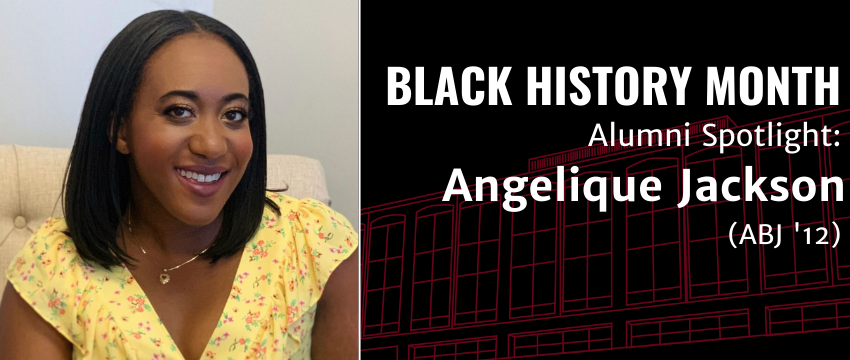Black History Month Alumni Profile: Angelique Jackson

Black History Month Alumni Profile: Angelique Jackson
Angelique Jackson (ABJ ’12) is a senior entertainment writer for Variety. She previously worked at Entertainment Tonight, where she was awarded two Daytime Emmy Awards as a segment producer. During her time at Grady College, Jackson was a reporter and anchor for Grady Newsource, a member of the Student Alumni Council and a participant in the Cannes Film Festival Study Abroad Program.
What does Black History Month mean to you?
This month is a celebration of all we’ve achieved as Black people, but it shouldn’t be the only celebration. In some ways, I feel like this month serves as a reset – a chance to check in as a community to focus on the future and what hurdles we can overcome next. It’s a moment to take inspiration from those past accomplishments and to use those lessons to build something new.
Explain a challenge that you had to overcome in your professional career.
The greatest challenge I’ve had to endure in my career was learning to advocate for myself. In school, when you make good grades or put forth a lot of effort, you’re likely rewarded without having to ask. But in real life – and especially in journalism – it’s imperative to promote your work so that your effort cuts above the noise. While your good work will build your professional reputation, there is something to say for engaging with your audience and with your bosses to make sure that people know the effort that you’re putting in.
What classes at Grady College did the most to prepare you for your career?
Newsource was the best preparation any journalist could ask for. I’m always surprised to learn that other journalists in my orbit didn’t have the experience of performing every newsroom duty while still in college. From the first time I transcribed an interview to the moment I stepped onto a red carpet or produced a news segment (live or otherwise), I’ve used the skills that I was taught in those classes about reporting, writing stories, editing, anchoring and more.
What clubs and activities did you participate in at UGA and Grady that were instrumental to your success as a career professional?
During my tenure at UGA, I was a board member for the Student Alumni Council. That experience taught me so much about the University itself, but it also provided great networking training. As an SAC member, we established relationships with people of all ages and from all sectors of industry. As journalists, relationships are everything and networking is key to that success. Getting the best interviews requires publicists and subjects to trust you and your reporting, and a big part of building that rapport comes from being in the right rooms and knowing how to get there. You never know who you’ll meet that will help you land that next job or bag that exclusive interview!
How has your field of study changed since you were a Grady student?
Broadcast journalism is no longer solely about TV. With the rise of multimedia platforms and social media as a journalism tool, plus the public’s ability to use it and serve as citizen journalists, the definition of “news” and how to get it has expanded — for better or worse. I like to think it’s for the better, not only because it broadens access to the field, but it also stretches the journalists’ imaginations, urging us to think outside of the TV box when it comes to best reaching their audience.
What does the recent movement to continue the fight for racial justice mean to you personally and professionally?
Personally, every day since June 2020 has been trying – but, if I’m honest, living as a Black person in America is trying most days. But we find joy each day, despite it all. Professionally, the recent movement has allowed me to find a way to use my work to fight for racial justice. As a writer and reporter, I’m able to frame the narrative about us as Black people with an emphasis on our humanity and a broader view on what makes our culture distinct, unique and not monolithic. This is a moment when we have the microphone and it’s imperative that we not waste it.
What advice would you give to young students of color who will soon enter the workforce?
Embrace everything that makes you, you. Embrace your culture, your heritage, your hair, the color of your skin and bring them to your work. Those elements of your personal history and the experiences that you’ve had because you’re a person of color — both positive and challenging — will prove valuable in your reporting because they inform your point of view. Don’t suppress those parts of yourself or allow others to persuade you to do so. We as a journalism community need your voice, but the public that you’re serving needs your perspective even more. Use your lens to tell our stories.